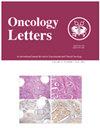Implication of PD‑L1 polymorphisms rs2297136 on clinical outcomes of patients with advanced NSCLC who received PD‑1 blockades: A retrospective exploratory study.
IF 2.2
4区 医学
Q3 ONCOLOGY
引用次数: 0
Abstract
Clinically, programmed death-1 (PD-1) blockades have demonstrated promising therapeutic outcomes for patients with advanced non-small cell lung cancer (NSCLC). The present study aimed to examine the impact of programmed death-ligand 1 (PD-L1) polymorphism on clinical outcomes of patients with advanced NSCLC who were treated with PD-1 blockades therapy. The present study was designed as a retrospective analysis, where a consecutive screening of 89 patients with advanced NSCLC who received PD-1 blockades monotherapy were screened. Biological specimens were collected to determine the presence of polymorphism and PD-L1 mRNA expression through genotyping. The analysis focused on examining the relationship between the genotype status of PD-L1 polymorphism and clinical outcomes. Among the 89 patients with advanced NSCLC, the use of PD-1 blockades monotherapy resulted in objective response rate (ORR) of 22.5%, a median progression-free survival (PFS) of 3.4 months [95% Confidence Interval (CI): 1.80-5.00) and a median overall survival (OS) of 11.3 months (95% CI: 7.93-14.67). The analysis of polymorphism indicated that only rs2297136 had clinical significance. Among the 89 patients with NSCLC, the prevalence of rs2297136 was as follows: A total of 58 cases (65.2%) had the AA genotype, 28 cases (31.5%) had the AG genotype and 3 cases (3.4%) had the GG genotype. This resulted in a minor allele frequency of 0.19, which was in consistent with Hardy-Weinberg Equilibrium (P=0.865). The correlation analysis between genotype status of rs2297136 and clinical outcomes indicated that patients with the AA genotype had an ORR of 19.0%, while those with the AG/GG genotype had an ORR of 29.0% (P=0.278). Additionally, the median PFS for the AA genotype was 2.95 months, compared with 5.30 months for the AG/GG genotype (P=0.038). Accordingly, median OS of the AA and AG/GG genotypes was 8.8 and 18.4 months, respectively (P=0.011). The mRNA expression of PD-L1 was significantly higher in patients with AG/GG genotype compared with those with AA genotype (P<0.001). In clinical practice, PD-1 blockades demonstrated promising effectiveness in treating patients with advanced NSCLC. The presence of the rs2297136 variant in PD-L1 gene could potentially be used as a biomarker to predict the clinical outcomes of PD-1 blockades.PD-L1 多态性 rs2297136 对接受 PD-1 阻断剂治疗的晚期 NSCLC 患者临床预后的影响:一项回顾性探索研究
在临床上,程序性死亡配体1(PD-1)阻断剂对晚期非小细胞肺癌(NSCLC)患者的治疗效果很好。本研究旨在探讨程序性死亡配体1(PD-L1)多态性对接受PD-1阻断剂治疗的晚期NSCLC患者临床疗效的影响。本研究采用回顾性分析方法,连续筛选了89名接受PD-1阻滞剂单药治疗的晚期NSCLC患者。收集生物标本,通过基因分型确定多态性的存在和 PD-L1 mRNA 的表达。分析的重点是研究 PD-L1 多态性的基因型状态与临床预后之间的关系。在89例晚期NSCLC患者中,使用PD-1阻断剂单药治疗的客观反应率(ORR)为22.5%,中位无进展生存期(PFS)为3.4个月(95% 置信区间(CI):1.80-5.00),中位总生存期(OS)为11.3个月(95% CI:7.93-14.67)。多态性分析表明,只有 rs2297136 具有临床意义。在 89 例 NSCLC 患者中,rs2297136 的发生率如下:共有 58 例(65.2%)为 AA 基因型,28 例(31.5%)为 AG 基因型,3 例(3.4%)为 GG 基因型。这导致小等位基因频率为 0.19,符合哈代-温伯格平衡(P=0.865)。rs2297136 基因型状态与临床结果之间的相关性分析表明,AA 基因型患者的 ORR 为 19.0%,而 AG/GG 基因型患者的 ORR 为 29.0%(P=0.278)。此外,AA 基因型患者的中位 PFS 为 2.95 个月,而 AG/GG 基因型患者为 5.30 个月(P=0.038)。因此,AA基因型和AG/GG基因型的中位OS分别为8.8个月和18.4个月(P=0.011)。与 AA 基因型患者相比,AG/GG 基因型患者的 PD-L1 mRNA 表达量明显更高(P<0.001)。在临床实践中,PD-1 阻断剂在治疗晚期 NSCLC 患者方面显示出良好的疗效。PD-L1基因中rs2297136变异的存在有可能被用作预测PD-1阻断剂临床疗效的生物标志物。
本文章由计算机程序翻译,如有差异,请以英文原文为准。
求助全文
约1分钟内获得全文
求助全文
来源期刊

Oncology Letters
ONCOLOGY-
CiteScore
5.70
自引率
0.00%
发文量
412
审稿时长
2.0 months
期刊介绍:
Oncology Letters is a monthly, peer-reviewed journal, available in print and online, that focuses on all aspects of clinical oncology, as well as in vitro and in vivo experimental model systems relevant to the mechanisms of disease.
The principal aim of Oncology Letters is to provide the prompt publication of original studies of high quality that pertain to clinical oncology, chemotherapy, oncogenes, carcinogenesis, metastasis, epidemiology and viral oncology in the form of original research, reviews and case reports.
 求助内容:
求助内容: 应助结果提醒方式:
应助结果提醒方式:


